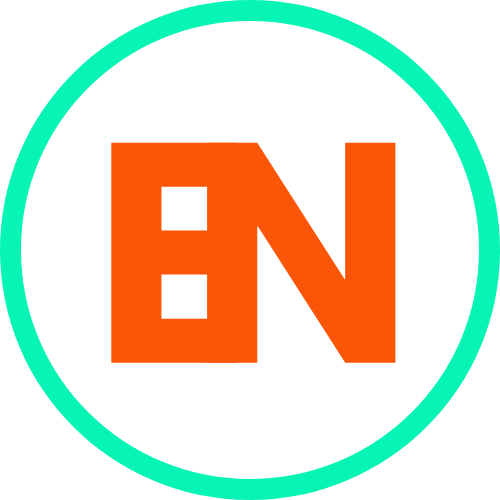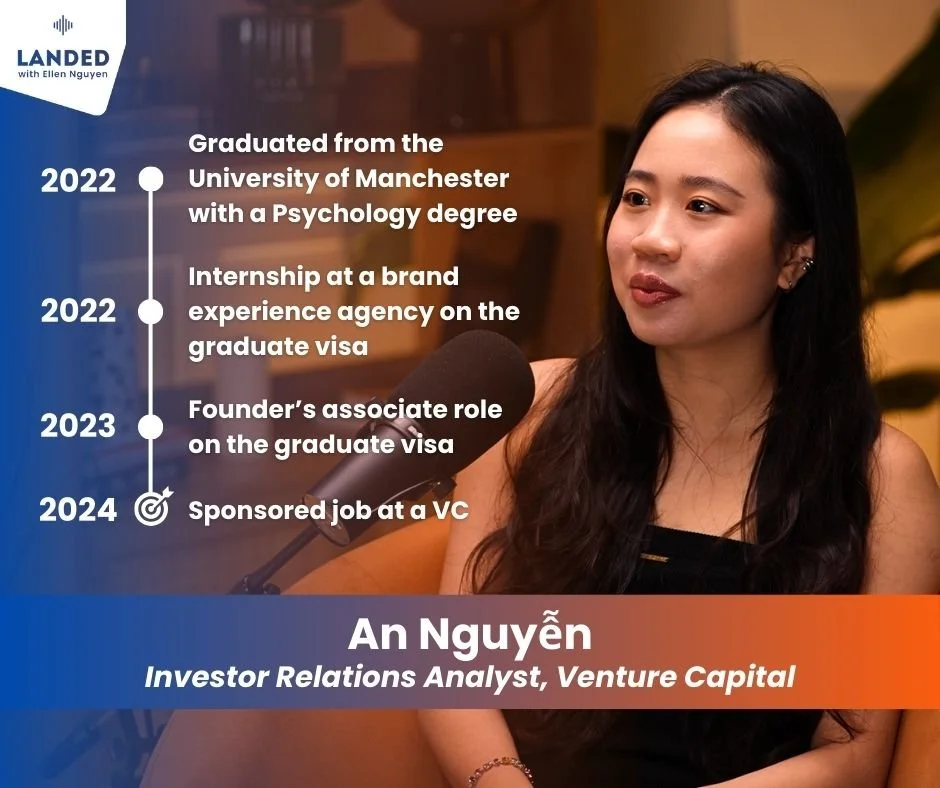I Had 2 Jobs on a Graduate Visa Before a VC Finally Sponsored Me | Landed Ep 1
An Nguyễn, originally from Vietnam, went from studying psychology at the University of Manchester to landing a sponsored role as an Investor Relations Analyst at a venture capital firm.
It took her two roles—an internship at a brand experience agency and a founder’s associate role at a startup—before securing sponsorship in venture capital just before her graduate visa expired.
Here’s how she made it happen:
1. Find the right jobs to apply for
Focus on low-hanging fruit: An began her career journey by targeting roles that closely aligned with her existing skills and experiences, such as brand experience internships. By leveraging her CV's strengths, she positioned herself as a standout candidate for these roles. This approach allowed her to gain relevant work experience while reducing the likelihood of rejection.
Do your research: Instead of relying solely on traditional job boards, An took a proactive approach. She Googled "Top Brand Agencies in London," visited each company's website, and applied directly through their careers pages. For companies that didn’t have openings, she sent her CV through their “Work with Us” pages. This initiative gave her access to hidden opportunities and set her apart from less proactive applicants.
Proactively seek opportunities: An didn’t wait for jobs to land in her lap. She was constantly looking for roles that matched her skills and interests while identifying opportunities where she could add value.
2. Interview tips
Show, don’t tell: An demonstrated her qualities by providing concrete examples during interviews. For instance, to showcase her resourcefulness, she shared how she independently navigated challenges as an international student living in the UK, securing scholarships, and adapting to new environments. To highlight her ability to handle fast-paced settings, she described her experiences in her internship, where she efficiently managed multiple client events under tight deadlines while maintaining high standards.
Tailor your approach: Before every interview, An carefully analysed the job description to identify the qualities and skills employers valued most. She then structured her responses around those attributes, weaving in specific keywords and tailoring her examples to align with the role. For instance, in her founder associate interview, she emphasised qualities such as independent thinking, a proactive work ethic, and her willingness to take on diverse responsibilities, all of which were critical for the startup environment.
Stand out at every corner: An treated every stage of the application process as an opportunity to differentiate herself. During her founder associate application, she recorded a video introduction that showcased her personality, professionalism, and understanding of the role. In interviews, she used storytelling to make her answers memorable, framing her achievements in a way that aligned with the company's goals and values. Even in written applications, she avoided generic statements and focused on clear, specific examples that highlighted her unique value.
3. Strategic career moves
Reflect and adjust: Each role An took on helped her refine her understanding of what she wanted in her career. For instance, during her internship at a global brand experience agency, she realized she wanted to be closer to the decision-making process. This realization led her to pursue a founder associate role at an early-stage startup, where she gained exposure to strategic decisions. In this role, she discovered her love for fast-paced environments but recognized a need for more stability, prompting her move to venture capital.
Plan ahead: An didn’t wait until her visa or job contract was about to expire to start planning her next move. For example, while working in her founder associate role, she began browsing for other opportunities six months in advance. This gave her time to calmly assess options and apply to roles that matched her growing understanding of her career goals. As her graduate visa’s expiration date approached, she specifically targeted positions that offered sponsorship or had the potential for it in the near future.
4. Navigating the sponsorship conversation
Be transparent: An approached sponsorship discussions with honesty and confidence. From her very first conversation with the talent lead at the venture capital firm, she openly shared her visa status and asked whether sponsorship was a possibility. Her transparency ensured there were no surprises later in the process.
Follow up thoughtfully: Sponsorship can be a complex process, and An made sure it stayed on her employer’s radar. In regular 1:1 meetings and probation discussions, she tactfully reminded her managers of her visa needs. This proactive communication ensured that the sponsorship process was initiated promptly.
Guide employers through the process: Many companies are unfamiliar with visa sponsorship requirements. An was prepared to guide her employer through the process when needed.


